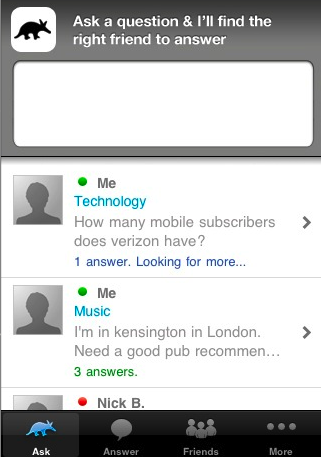Aardvark Launches iPhone App For Answers “On The Go”
Aardvark, which can be described variously as a “social search engine, “help engine” or “answer community,” has launched an iPhone app. It was many months in the making according to co-founder Max Ventilla. And with it, Aardvark arrives on what may be its breakthrough platform, helping to introduce the service to the mainstream — or […]
Aardvark, which can be described variously as a “social search engine, “help engine” or “answer community,” has launched an iPhone app. It was many months in the making according to co-founder Max Ventilla. And with it, Aardvark arrives on what may be its breakthrough platform, helping to introduce the service to the mainstream — or at least iPhone users.
The site offers many entry points where users can ask questions: Vark.com, Facebook, Twitter, IM. However, the bulk of questions come in via IM currently. In addition, you can choose to receive responses via email. Until now Aardvark has been obscure to many people. But the iPhone app should make clear what the site is and does as well as make use cases fairly self-evident. Mobile was always one of the primary scenarios for the service, as a mixture of mobile search and directory assistance 2.0.
According to Ventilla the majority of questions people ask are answered within five minutes. That is consistent with my experience of the service as well. Ventilla said that Aardvark built the iPhone app not because the company saw growing mobile usage overall but specifically because its “power users” were accessing the site through mobile phones.
“People really like connecting with friends over the iPhone,” explained Ventilla. “We designed the product with utility as the primary driver, but it has a real social dimension on the iPhone.” That is further magnified if you sign in to the iPhone app with Facebook Connect.
Several months of testing with an alpha group of power Aardvark users resulted in several modifications, one of which was the removal of a planned voice/speech interface. “We built it but the added complexity scared some people away,” he told me. So they’re deferring the introduction of speech until later.
The iPhone app also comes with push notifications. Indeed, Ventilla told me that the app they built wouldn’t have been possible before the iPhone software 3.0 update, which includes push notifications among other features. And there are features that will be added to future versions of the iPhone Aardvark app that build on the 3.0 software’s capabilities.
The iPhone app becomes a kind of mobile archive for all your history, responses and recommendations. You can thus access that past restaurant or hotel recommendation from the iPhone app. This PC-mobile connection allows people to use both sides of the service: ask a question from home or office and retrieve the answer on the iPhone app later — on the go. This capability should contribute to its popularity.
Aardvark’s “secret sauce” is the machine intelligence that regulates, routes and mediates the delivery of questions and answers to the community. The marketing challenge, however, is to grow that community and usage accordingly. I believe the iPhone app will help do that. If so, once Aardvark gains increasing usage a kind of momentum will take over where users get answers more quickly, which will reinforce usage in turn.
If Aardvark were to succeed as a social mobile search engine it could become a primary or preferred tool for users seeking restaurants, things to do or other types of recommendations or answers “on the go” — the equivalent of word of mouth. It’s not a replacement for Google but for many queries and questions it will be easer to use than conventional search on mobile devices, which is still awkward and challenging in most respects.
Contributing authors are invited to create content for Search Engine Land and are chosen for their expertise and contribution to the search community. Our contributors work under the oversight of the editorial staff and contributions are checked for quality and relevance to our readers. The opinions they express are their own.
Related stories
New on Search Engine Land

